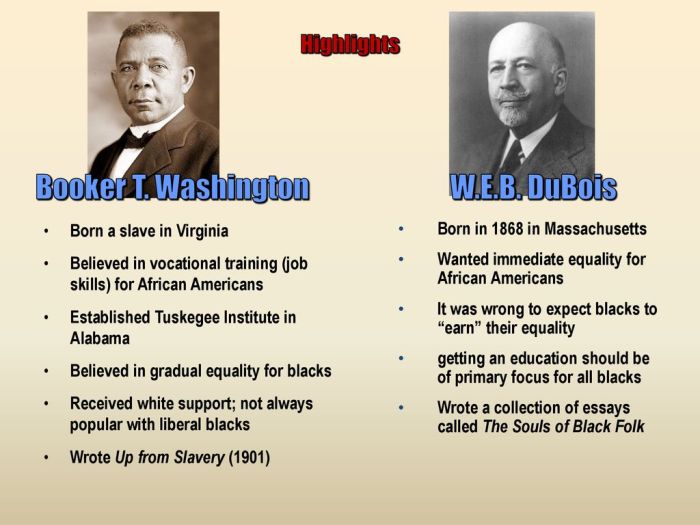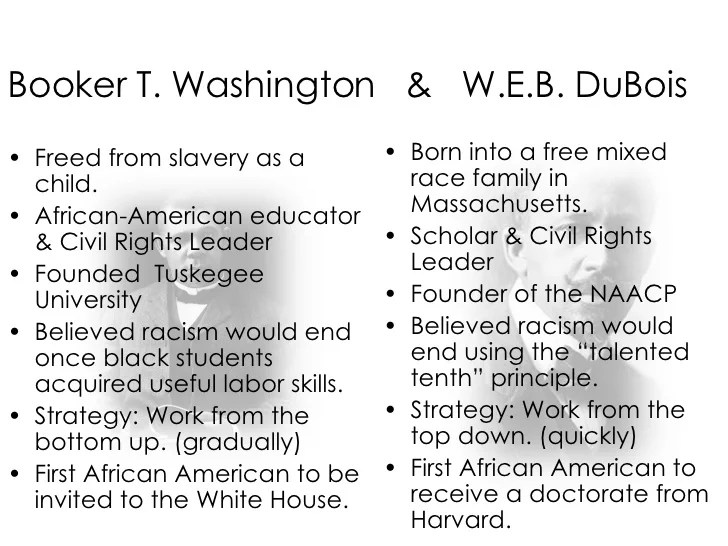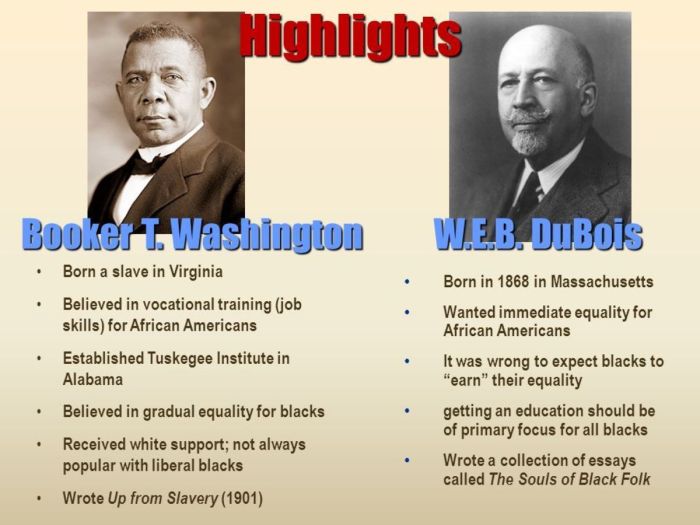Compare and contrast washington and dubois – In the annals of American history, Booker T. Washington and W.E.B. Du Bois stand as towering figures in the fight for racial equality and social justice. Their contrasting ideologies and strategies shaped the African American experience in profound ways, leaving a lasting legacy that continues to resonate today.
From their humble beginnings to their influential leadership roles, Washington and Du Bois pursued distinct paths to advance the cause of their people. Washington advocated for gradualism and economic self-sufficiency, while Du Bois championed radical change and intellectual advancement. Their divergent approaches, though often at odds, ultimately contributed to the multifaceted struggle for civil rights.
Historical Background

Washington and Du Bois were born into very different historical contexts. Washington was born in 1856, shortly after the end of the Civil War, while Du Bois was born in 1868, during the Reconstruction era. Washington grew up in a rural area of Virginia, while Du Bois grew up in a more urban environment in Massachusetts.
Both men were exposed to racial discrimination from a young age, but Washington’s experiences were more direct and personal, while Du Bois’s experiences were more indirect and institutional.
Washington’s education was limited, as he was only able to attend school for a few months each year. Du Bois, on the other hand, was able to attend some of the best schools in the country, including Fisk University and Harvard University.
Washington’s early experiences were geprägt by the poverty and discrimination that he faced as a black man in the post-Civil War South. Du Bois’s early experiences were geprägt by the intellectual and cultural ferment of the late 19th century.
The social and political climate during Washington’s and Du Bois’s lifetimes was one of great change and upheaval. The Civil War had just ended, and the country was still struggling to come to terms with the issue of racial equality.
The Reconstruction era was a time of great hope and progress for African Americans, but it was also a time of great violence and oppression. The Jim Crow era, which began in the late 19th century, was a time of legalized segregation and discrimination against African Americans.
Washington and Du Bois lived and worked during a time of great social and political change, and their work was shaped by the challenges and opportunities of their time.
Ideologies and Beliefs: Compare And Contrast Washington And Dubois

Washington and Du Bois had very different ideologies and beliefs about how to achieve racial equality. Washington believed in gradualism, or the idea that progress towards racial equality should be achieved through slow, incremental steps. He believed that African Americans should focus on economic self-sufficiency and vocational education as a way to improve their lives and gain the respect of whites.
Du Bois, on the other hand, believed in radical change, or the idea that progress towards racial equality should be achieved through more direct and confrontational means. He believed that African Americans should focus on higher education, intellectual advancement, and political organizing as a way to challenge white supremacy and achieve full equality.
Washington’s views on racial equality were shaped by his own experiences of discrimination and his belief that African Americans could only achieve progress through hard work and self-reliance. Du Bois’s views on racial equality were shaped by his own experiences of discrimination and his belief that African Americans could only achieve progress through collective action and political change.
Washington’s and Du Bois’s beliefs shaped their activism and leadership styles in different ways. Washington was a pragmatic leader who focused on building bridges between African Americans and whites. He believed that the best way to achieve racial equality was to work within the existing system and to avoid confrontation.
Du Bois, on the other hand, was a more confrontational leader who was willing to challenge white supremacy directly. He believed that the best way to achieve racial equality was to organize African Americans and to fight for their rights.
Methods and Strategies

Washington and Du Bois used very different methods and strategies to achieve their goals. Washington focused on economic self-sufficiency and vocational education as a way to improve the lives of African Americans. He founded the Tuskegee Institute in 1881, which was a vocational school that taught African Americans skills such as farming, carpentry, and blacksmithing.
Washington believed that economic self-sufficiency was the key to racial equality, and that African Americans could only achieve progress by becoming self-reliant.
Du Bois, on the other hand, focused on higher education, intellectual advancement, and political organizing as a way to challenge white supremacy and achieve full equality. He founded the Niagara Movement in 1905, which was a group of African American intellectuals and activists who advocated for civil rights and social justice.
Du Bois believed that African Americans needed to be educated and organized in order to fight for their rights.
Washington’s and Du Bois’s methods and strategies had different strengths and limitations. Washington’s focus on economic self-sufficiency helped to improve the lives of many African Americans, but it did not challenge the system of white supremacy. Du Bois’s focus on higher education, intellectual advancement, and political organizing helped to raise awareness of the issue of racial inequality and to challenge white supremacy, but it did not always lead to concrete improvements in the lives of African Americans.
Popular Questions
What were the key differences between Washington’s and Du Bois’s ideologies?
Washington believed in gradualism and economic self-sufficiency, while Du Bois advocated for radical change and intellectual advancement.
How did Washington’s Tuskegee Institute contribute to the African American community?
Tuskegee Institute provided vocational training and education to thousands of African Americans, empowering them with skills and knowledge to achieve economic independence.
What was the significance of Du Bois’s role in the NAACP?
As a founder and leader of the NAACP, Du Bois played a crucial role in challenging racial discrimination through legal battles and advocacy campaigns.